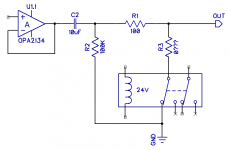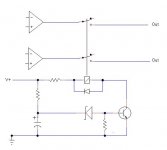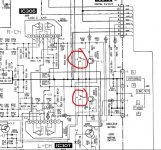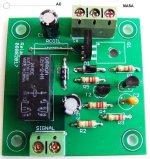I'm working on a preamp muting circuit based around a normally-closed relay that shorts the preamp output to ground for a couple seconds after power-on and then again on power-off.

The circuit was originally designed for a single-ended preamp, but now I am using it with an OPA2134 opamp.
My question is whether the opamp will be happy with its output shorted to ground (through a 100 ohm series resistor, R1), or whether I should add some additional resistance to R3.
The data sheet for the OPA2134 says it is rated for a continuous short circuit to ground, but only for one amplifier per package. So it sounds like I might be okay, but I would prefer it to design conservatively.
Any input would be appreciated.
Thanks,
Rory

The circuit was originally designed for a single-ended preamp, but now I am using it with an OPA2134 opamp.
My question is whether the opamp will be happy with its output shorted to ground (through a 100 ohm series resistor, R1), or whether I should add some additional resistance to R3.
The data sheet for the OPA2134 says it is rated for a continuous short circuit to ground, but only for one amplifier per package. So it sounds like I might be okay, but I would prefer it to design conservatively.
Any input would be appreciated.
Thanks,
Rory
Shorting things to ground is generally a pretty bad idea.
You should be looking at blocking the output, not shorting it. It would be much smarter to put the relay contacts in series with the pre-amp output and turn it on by pulling in the relay a few seconds after power on.
You should be looking at blocking the output, not shorting it. It would be much smarter to put the relay contacts in series with the pre-amp output and turn it on by pulling in the relay a few seconds after power on.
I'm working on a preamp muting circuit based around a normally-closed relay that shorts the preamp output to ground for a couple seconds after power-on and then again on power-off.
View attachment 812186
The circuit was originally designed for a single-ended preamp, but now I am using it with an OPA2134 opamp.
My question is whether the opamp will be happy with its output shorted to ground (through a 100 ohm series resistor, R1), or whether I should add some additional resistance to R3.
The data sheet for the OPA2134 says it is rated for a continuous short circuit to ground, but only for one amplifier per package. So it sounds like I might be okay, but I would prefer it to design conservatively.
Any input would be appreciated.
Thanks,
Rory
I have a Buffalo DAC that's been with me since 2008 and has the same scheme.
It survives and plays music every day still. However it does use a LM4562
The datasheet assumes the shorted output is a DC current path, but here you have a 10uF cap in series. So I can't see any problems giving an opamp an AC coupled 100ohm load for a few seconds. Presumably as its at switch-on and switch-off, no music is playing. Benign in my estimation.
It would be much smarter to put the relay contacts in series with the pre-amp output
Perhaps in some parallel deaf universe. While in the real world there is absolutely no problem grounding an opamp output through a 100R resistor.
I'd provide a dual throw relay with a normally closed contact pair from output to ground and a normally open pair from output to opamp.
Best regards!
Best regards!
Okay, lets go back to the OP's premise of pulling in a relay for a couple of seconds right after power on, shorting the output to ground then dropping it out to allow it to play...
1) How long does it take the power supply to establish itself and pull in that relay? Is this not the same period of time during which the op-amps are struggling to stabilise themselves? So it is most likely the relay would pull in after the turn on thump it is intended to prevent.
2) The same issue exists at turn off. That moment of instability producing a turn off thump generally occurs during the overrun time when the power supply is draining it's capacitors, voltages are lowering and the op-amps are becoming unstable. Here, with reduced voltages, the relay is likely to not pull in at all, once again permitting a thump to go through the system.
3) While most op-amps are specified to withstand output shorts, nothing guarantees this is safe to do deliberately or frequently. The tolerance is, I'm sure, a protection against technician errors during service, rather than a savoir fare feature of the chip itself.
So, what's to be done about this?
We don't want any output from the pre-amp (tuner, cd player, amplifier, etc) during that initial moment of instability or during the final moments of shut down... The obvious answer is to block (not short) the output through a series connected relay contact then pull the relay in after a time delay, and drop it out when power rolls off during shutdown. So, the relay is pulled in all the time... that's how it's done in most commercial products and it's done that way for a reason.
The thumbnail shows a simplified delay turn on circuit that responds properly. When power is first turned on the capacitor is discharged, as it charges it will allow the base voltage of the transistor to rise and pull in the relay after some time delay (typically 3 to 5 seconds). At turn off the power supply rolls down, the drive is lost and the relay drops out almost immediately. Since the output is only enabled when the relay is energized, no thumps get past it.
1) How long does it take the power supply to establish itself and pull in that relay? Is this not the same period of time during which the op-amps are struggling to stabilise themselves? So it is most likely the relay would pull in after the turn on thump it is intended to prevent.
2) The same issue exists at turn off. That moment of instability producing a turn off thump generally occurs during the overrun time when the power supply is draining it's capacitors, voltages are lowering and the op-amps are becoming unstable. Here, with reduced voltages, the relay is likely to not pull in at all, once again permitting a thump to go through the system.
3) While most op-amps are specified to withstand output shorts, nothing guarantees this is safe to do deliberately or frequently. The tolerance is, I'm sure, a protection against technician errors during service, rather than a savoir fare feature of the chip itself.
So, what's to be done about this?
We don't want any output from the pre-amp (tuner, cd player, amplifier, etc) during that initial moment of instability or during the final moments of shut down... The obvious answer is to block (not short) the output through a series connected relay contact then pull the relay in after a time delay, and drop it out when power rolls off during shutdown. So, the relay is pulled in all the time... that's how it's done in most commercial products and it's done that way for a reason.
The thumbnail shows a simplified delay turn on circuit that responds properly. When power is first turned on the capacitor is discharged, as it charges it will allow the base voltage of the transistor to rise and pull in the relay after some time delay (typically 3 to 5 seconds). At turn off the power supply rolls down, the drive is lost and the relay drops out almost immediately. Since the output is only enabled when the relay is energized, no thumps get past it.
Attachments
The grounding of the opamp output is through the NC contact, and usually the relay activation time is sufficient by itself.
Power off is rarely an issue with properly done preamplifier outputs but even so the relay voltage is chosen so it drops out before the opamp reaches its turnoff voltage - typically +/-2.5V for most opamps, so a 12V relay will suffice as it drops out when the positive rail hits about 8V.
Again, opamps have no issue with outputs connected to ground through a low-value resistor.
It's a non-issue.
Power off is rarely an issue with properly done preamplifier outputs but even so the relay voltage is chosen so it drops out before the opamp reaches its turnoff voltage - typically +/-2.5V for most opamps, so a 12V relay will suffice as it drops out when the positive rail hits about 8V.
Again, opamps have no issue with outputs connected to ground through a low-value resistor.
It's a non-issue.
I would not anticipate any issues at all and shorting to ground like this is the way I would do it.
The fact it is AC coupled makes it even less of a problem. If it were DC coupled then the series resistance has to be high enough to allow the feedback network to keep control and allow the DC conditions to stabilise. In practice even a few ohms is sufficient for that.
The fact it is AC coupled makes it even less of a problem. If it were DC coupled then the series resistance has to be high enough to allow the feedback network to keep control and allow the DC conditions to stabilise. In practice even a few ohms is sufficient for that.
Thank you for the replies, everyone. I appreciate all the insight and experience.
I already have the slow on/fast off relay driver sorted out from a previous project, so this was mainly a question of whether I should:
a. Short the outputs to ground through the normally-closed contacts, or
b. Route the outputs through the normally-open contacts.
Shorting the outputs to ground during turn on/off seems a little more elegant because the relay contacts won't be in the signal path during normal operation, I just wasn't sure if it was applicable to an opamp output with a push-pull output stage.
I already have the slow on/fast off relay driver sorted out from a previous project, so this was mainly a question of whether I should:
a. Short the outputs to ground through the normally-closed contacts, or
b. Route the outputs through the normally-open contacts.
Shorting the outputs to ground during turn on/off seems a little more elegant because the relay contacts won't be in the signal path during normal operation, I just wasn't sure if it was applicable to an opamp output with a push-pull output stage.
Last edited:
<snip.because the relay contacts won't be in the signal path during normal operation, <snip>
This is exactly why it is done this way.
...which wouldn't matter at all, given high quality relays....because the relay contacts won't be in the signal path during normal operation...
Best regards!
That is at the mercy of relay contact oxidation though for its distortion performance, and leaves the output high impedance (hissy) until its enabled.Shorting things to ground is generally a pretty bad idea.
You should be looking at blocking the output, not shorting it. It would be much smarter to put the relay contacts in series with the pre-amp output and turn it on by pulling in the relay a few seconds after power on.
Switching to ground means the quality of the switch isn't so important, and no hiss when its off.
One question is whether the OPA2134 is stable into 100 ohms, which the datasheet doesn't answer. It probably is, and if not that 100R value was too small in the first place.
because the relay contacts won't be in the signal path during normal operation,
Just the series current limiting resistor...
Interesting discussion, though...
...which wouldn't matter at all, given high quality relays.
Best regards!
It has to be the right sort of relays - designed for signal level. Standard "high quality" relays are designed to survive mild arcing with minimal contact wear, but don't perform well with low currents, as oxide film builds up which requires a minimum current level to cut through reliably. Thin oxide films have non-linear resistance and often semiconducting behaviour you don't want in series with your circuit.
...The obvious answer is to block (not short) the output through a series connected relay contact...
That leaves the destination unterminated when mute.
While well-engineered gear is "often" OK this way, there's a lot of squirrelly gear around which will oscillate if inputs are left open.
It's a non-trivial problem to solve for ALL cases (even the dumb ones).
I have killed '709 opamps with a momentary short. I have not killed any newer opamp this way. I have not made a habit of shorting opamps so maybe my time will come. But I think in self-protection the makers scale things so opamps may be shorted quite recklessly.
That leaves the destination unterminated when mute.
A simple 10k resistor would fix that. But most often the next step is another piece of equipment that has to be stable with no inputs just in case it is operated that way by mistake.
When's the last time you heard a power-amp take off motorboating the minute you unplug the inputs?
- Home
- Source & Line
- Analog Line Level
- Muting opamp outputs



 !
!